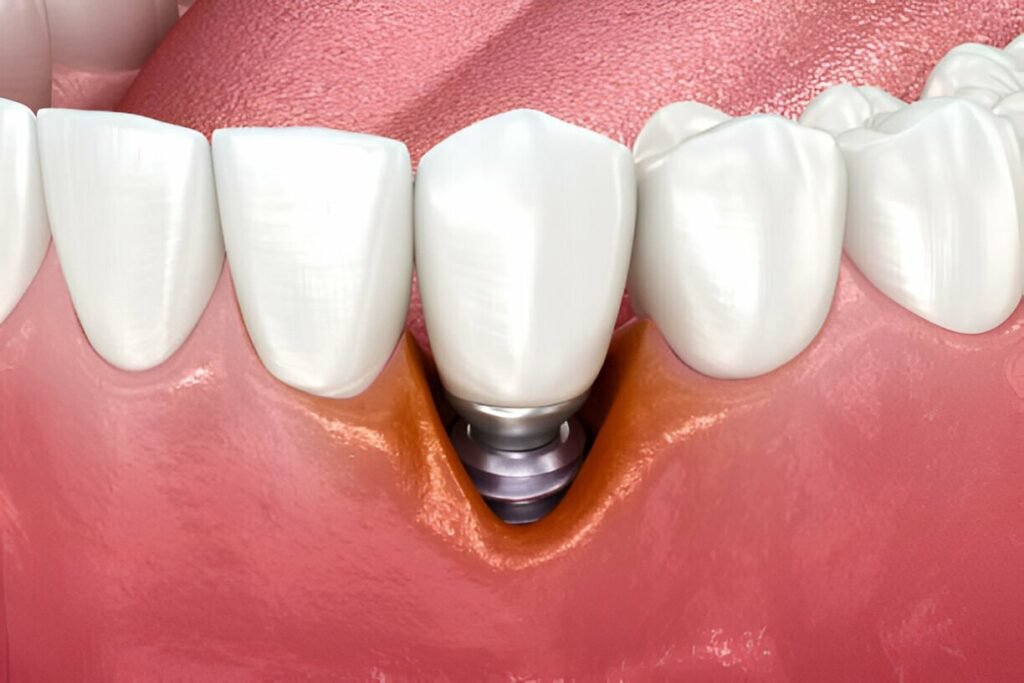Peri-implantitis is a tricky condition that might sneak up on you if you’ve got dental implants. It’s important to know the early warning signs to catch it before it becomes a bigger problem. This article will explain what peri-implantitis is. It will cover the symptoms to watch for and how to stop it early.
Understanding Peri-implantitis
Peri-implantitis is an infection that happens around dental implants. It’s a bit like gum disease, but it affects the tissues around an implant instead of your natural teeth. If it’s not treated right away, it can lead to serious damage, including the loss of the implant.
Spotting the Early Signs
Catching peri-implantitis early can save you a lot of trouble. Here are some early signs you should be on the lookout for:
- Discomfort or Sensitivity: If you start feeling a bit of discomfort or sensitivity around your implant, it’s worth paying attention to.
- Redness and Swelling: Keep an eye out for gums that are redder or more swollen than usual around the implant.
- Bleeding Gums: Bleeding, especially when you brush or floss around the implant, is a telltale sign.
If you notice any of these symptoms, don’t wait around. Have a chat with your dentist to get things checked out.
How Do You Know if Your Gums Are Strong Enough for Implants?
Recognising Advanced Symptoms
If peri-implantitis progresses, the symptoms can get worse. These include:
- Increased Pain: The area around the implant can start throbbing or hurting more.
- Bad Breath: You might notice your breath isn’t as fresh as usual, which can be a sign of infection.
- Loose Implant: If the implant feels wobbly, that’s a red flag that the bone around it might be affected.
- Pus: Yes, it sounds unpleasant, but pus is a clear sign of infection.
- Fever: If you’re feeling feverish, it could mean the infection is spreading.
Preventing Peri-implantitis
Prevention is always better than cure. Here’s how you can keep peri-implantitis at bay:
- Good Dental Hygiene: Brushing twice a day and flossing regularly is key.
- Regular Dental Check-ups: Don’t skip those appointments! Your dentist can spot signs of trouble early on.
- Quit Smoking: Smoking is not just bad for your lungs; it’s bad for your gums, too.
- Mind What You Eat: Try to keep sugary and sticky foods to a minimum as they can contribute to plaque build-up.
Treating Peri-implantitis
If you do end up with peri-implantitis, don’t worry—there are treatments that can help:
- Deep Cleaning: Sometimes, all you need is a thorough clean around the implant.
- Medication: Your dentist might prescribe antibiotics to knock out any infection.
- Advanced Treatments: For more serious cases, treatments like laser therapy or even surgery might be necessary to save the implant and restore your oral health.
Need Expert Care? Visit Bridge St Aesthetic and Dental Implant Clinic
If you think something’s not right with your dental implant, don’t hesitate. The sooner you act, the easier it is to treat peri-implantitis. At Bridge St Aesthetic and Dental Implant Clinic, your dental health is our top priority. Our team of skilled professionals is ready to assist you, whether you need a routine check-up or specialised treatment. If you’re looking for a reliable NHS dentist in Aberdeen, look no further. Contact us today and ensure your smile stays healthy and bright!
Remember, catching peri-implantitis early makes a world of difference. If you’re experiencing any symptoms, even mild ones, make an appointment with your dentist right away. It’s always better to be safe than sorry when it comes to your health!
By understanding what to look out for and taking preventive measures, you can protect your dental implants and keep your smile looking its best. Don’t let peri-implantitis take that away from you!
Frequently Asked Questions
How can I tell if I have peri-implantitis?
Look for symptoms like gum redness, swelling, pain, bad breath, and a loose implant. These are common indicators of peri-implantitis.
What causes peri-implantitis?
It’s often caused by poor oral hygiene, the buildup of bacteria around the implant, smoking, or an improperly fitted implant.
Can peri-implantitis be cured?
Yes, with proper treatment which may include antibiotics, mechanical cleaning, or possibly surgery depending on severity, peri-implantitis can be managed effectively.
How can I prevent peri-implantitis?
Maintain excellent oral hygiene, quit smoking, ensure your dental implants are properly fitted, and attend regular dental check-ups to prevent peri-implantitis.





